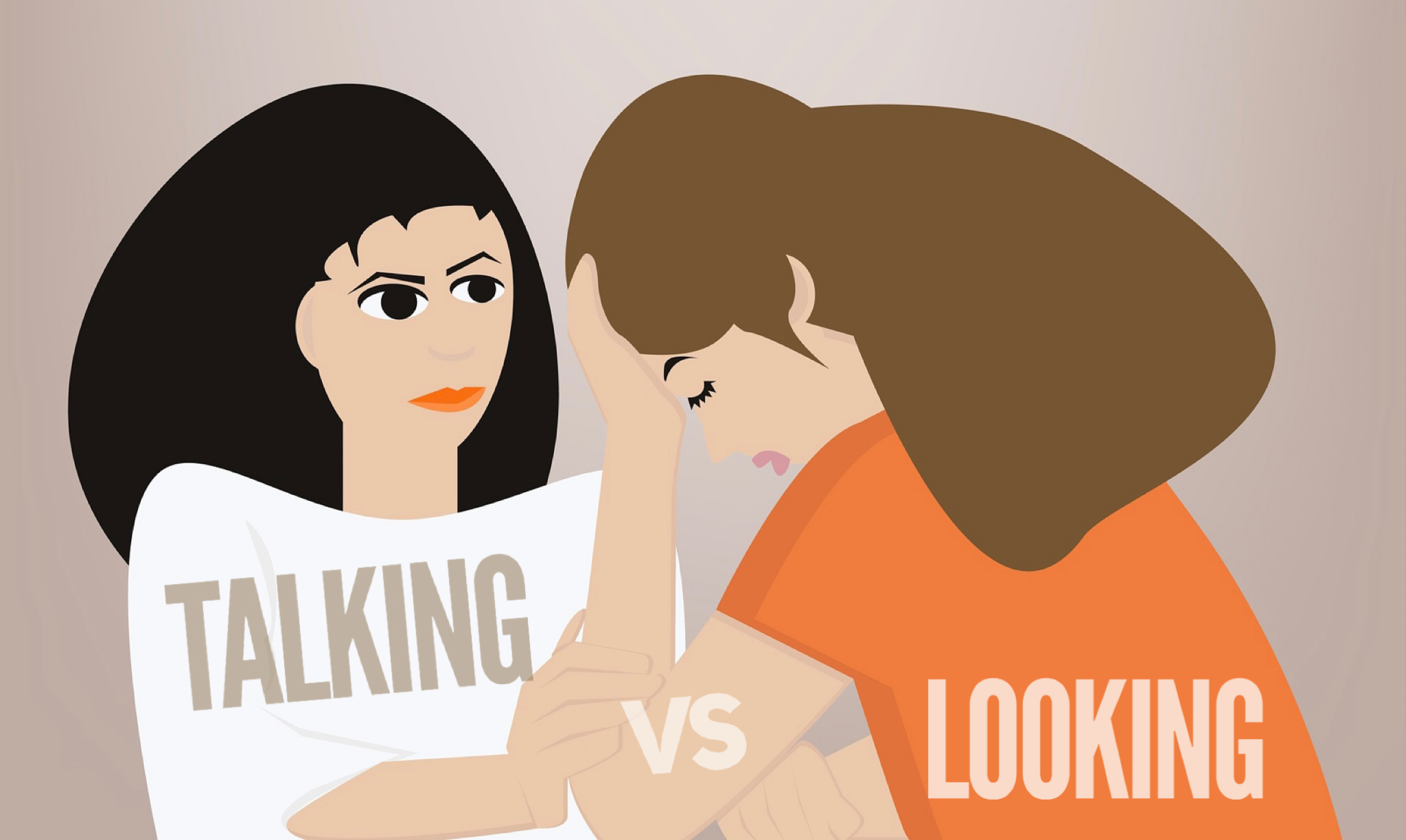Talking and looking are as different as years and minutes…
How long does it take to solve a personal problem?
Better question: How long SHOULD it take to solve that problem?
The answer varies depending on whether you’re looking at it or talking about it.
This may at first appear to be relative to the situation and type of problem and would seem to vary with the complexity of the problem itself. But the laws of cause and effect would say otherwise, as addressing one or the other gives a vastly different outcome.
Have you ever noticed that some problems seem to resolve easily while others feel more “eternal” in nature, going on for years with no solution in sight, the latter case being very common in today’s world?
This is only a difference, not in the size of the issue, but in the approach to handling it.
The lingering, apparently unsolvable problems are what everyone seems to be “talking about” in trying to solve them. Attempting to “talk it out” seems to be the go-to for at least feeling a little better for the moment. This is understandable because getting some relief is better than experiencing no change at all.
But, calmed for the moment, there the issue yet waits to be “triggered” again and cause stress, travail and generally unhappy states of mind. In other words, you’ll get relief from it but yet have to live with it, as opposed to finding the “trigger” behind it and ridding yourself of it.
It’s a vast difference between relief from something and riddance of it altogether.
Many people go on for years talking about their recurring difficulties to friends or even endure decades of “counseling” with the aim of feeling better or coping and otherwise (let’s face it) living with their issues, troubles, difficulties and problems.
But is there a better way? Does it have to take years? Will we ever get over things totally? Can you recover happiness that seems to have been replaced by troubled states of mind?
Not only is it possible, but there is a native sense of happiness everyone has that can be recovered and unleashed if you understand ONE KEY DIFFERENCE between talking about and looking at problems.
It all unravels simply if you know this…
What you need to know to solve any problem…
Let’s start with a simple analogy as to the difference between talking and looking.
Fred is 45. In his younger years he loved eating spicy foods but now ends up with digestive distress when he so indulges. He continues to eat his favorite foods and takes digestive aids and relief meds to soothe the problem. It becomes his new normal.
On further investigation, it is found that Fred has a deficiency of 3 or 4 vitamins that is causing his digestive system to malfunction and is further causing some issues including his digestive intolerance for spicy foods.
After years of taking relief aids, he supplements his deficiencies, his digestive system starts to work the way it should and, voila! He can eat spicy foods once again.
In this example, Fred was first “talking” to the problem itself. His body was telling him not to eat spicy foods and taking relief meds was his way of communicating back. And the “conversation” went on for years.
But, “looking” a bit beyond the surface manifestations he found the actual issue and addressed that. And that got rid of the problem altogether.
Relief versus riddance, talking versus, looking, these are the same kind of thing.
It all comes down, first, to UNDERSTANDING that there is a cause, way back at the beginning of any effect. Tracing things to a source, an origin, a cause of an issue, is what real change is made of.
Why looking beats talking: cause and effect!
The laws of cause and effect are at play everywhere in life, and many of us use them successfully in everyday living.
Auto mechanics and technicians study in school, not about broken cars, but how cars are supposed to operate. They use their knowledge of the structure, function and purpose of the design of cars to discover the source of the problems when they occur and fix those issues.
In our example about Fred, he visited a doctor who was trained not in digestive issues, but in how the digestive and other body systems are supposed to operate by design and so can diagnose and treat digestive issues by finding their real cause.
Computer tech, appliance repair, any problem-solution-driven activity is based on this model.
So why aren’t personal issues approached in this same way?
This is the difference between discussion of issues and problem-solving, the difference between talking about issues and looking at their cause.
Just as the auto mechanic should know how a “working car” optimally functions, shouldn’t we know our own full potential, the potential of the mind and how much happiness with which we are natively endowed? If we knew the ideal function of our minds, wouldn’t we be better at pinpointing what’s actually wrong instead of just talking about it endlessly?
When you focus on understanding the ideal, the current situation starts to unfold rather rapidly. And years of “talking it out” often become minutes or hours of locating cause and restoring native happiness and enjoyment of life.
So how do you do this?
A real counseling program starts with YOU as the counselor…
In the end, no matter who you approach for help in solving problems, they are only helping YOU solve the problem. Yes, that means you are the counselor, ultimately.
Just talking, you’re simply communicating the problem to another, but not really looking at it, examining it and connecting it up in any way to any cause, oblivious of a source of it earlier in time. And, per the laws of cause and effect, there will always be one.
Anyone helping you can, at best, be a guide and a stable hand to hold to get you through it. And this is helpful and often needed, very essential in many cases.
What would you need for an effective counseling program?
It’s pretty clear that, fundamentally, you would need to have,
- a basic understanding of the mind,
- the knowledge that every effect has a cause,
- a desire for riddance over coping with it,
- a set process that gets you to look instead of talk,
- someone to supervise and ensure you find answers.
Most of all you would need it to be a process that provided a very specific result, a positive, permanent change leaving you progressively happier.
The Self-Counseling program we offer is based on workable methods developed over 75 years ago and which have been helping people, per their reports, make significant and profound changes in their happiness levels, ways of dealing with life, competence, communication level and general success in business and in life.
It is closely supervised by an expert counselor and includes a guide you can use to address very precise areas. Personalities and even reaction times have been shown to improve from this. In fact, the metrics in the guide even allow you to track your progress related to these areas.
Interestingly enough, solving the troubles and difficulties of life is the least of what many are saying it has done for them. Imagine recovering the happiness and enjoyment of life you thought you lost. How much better would problem-solving be in that state of mind? And, would you have as many problems in that condition?
That’s up to you to find out and answer for yourself, and this Self-Counseling program makes it possible for you to do just that, with the assistance of an expert.
Start with the Master Your Mind Self Test here or inquire about Self-Counseling directly by calling (727) 216-5504.






